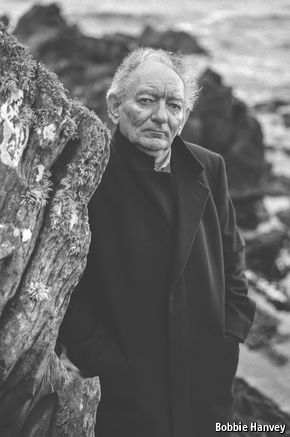IF YOU were to catch Brian Friel in some public house in Derry he might well be joking, “getting the crack”, his blue pixie’s eyes in his red lumpish face glinting with mischief and fun. On the other hand he might be sitting out of the way, nursing his beer with that look of moroseness that he had, and not inclined to answer questions. For there was a Private Friel, extrovert and witty with his friends, and a Public Friel who wanted to speak only through his plays and would not have slick interviewers define him otherwise: a bleak sort of fella, deadly serious in intent, whose natural state was a deep sense of confusion and ambivalence towards the world.
He had written 30 plays of a calibre that placed him with Beckett, Synge and O’Casey. In London and New York he was feted almost as much as at home in Derry. Yet his canvas was very small. He wrote chiefly about his own people and about one place, Ballybeg (“small town”), based on Glenties in County Donegal where he had spent idyllic holidays with his mother’s family as a child. His close love of Ireland led him in 1980 to set up the Field Day Theatre Company in Derry “to free Irish voices [for] Irish ears”, away from the cultural pressure of metropolises on both sides of the pond.
Ireland
His Irish idyll, though, was a vexed one: romantic but static, full of myths, rituals and illusion, tranquil yet riven with subterranean anger and frustration. It appeared most memorably in “Dancing at Lughnasa” (1990), where five spinster-sisters, based loosely on his aunts, were inspired by their missionary-brother’s return from Africa to leave the patient glove-knitting, bilberry-picking and table-laying to howl and dance round the kitchen like pagans. The same theme coloured “Philadelphia, Here I Come!” (1964), in which a young man, Gareth O’Donnell, emigrating from Ballybeg to America, was tormented by the thought both of leaving and of staying. Two actors played him, Public and Private Gareth, chattering away to do his head in even over the saying of the rosary: amid ritual certainties, uncertainty personified.
Ballybeg lay just across the border from the North, and something of Mr Friel’s ambivalence lay in Ireland’s own divisions. As a grown man he would slip between North and South not noticing the border—the landscape not changing, after all—and would love to look on Derry, especially at twilight, with the Foyle winding seawards between the lazy docks. As a thieving little urchin, though, growing up Catholic in the divided city, he had been terrified of going to the shoemaker’s lest the Protestant boys got him. He was drawn to nationalism, but left the Nationalist Party after a few years; he knew Gaelic, but kept the extent of that secret, lest it harm his even-handedness. His most political play, “The Freedom of the City” (1973), based on the judicial inquiry that followed Bloody Sunday and opening with bodies sprawled on the stage, was not, he said, really about the Troubles. It was about the difficulty of establishing truth: any sort of truth.
Beyond words
This was a permanent theme in his work. His characters, largely inarticulate villagers, farmers or priests, struggled to decide whether the new truths bruising in were more credible than their memories, their legends or their fathers’ lectures. They tried, like the characters in Chekhov’s plays (which he loved and translated), to take refuge in the “aul ways” against the freezing winds of change. In “Translations” (1980), perhaps his best play, in which British military surveyors in the 1830s came to impose new Anglicised placenames on Ireland, the characters tried to make do in Latin and Greek as well as the Gaelic of the disappearing past. Only love, between a British soldier and an Irish girl, could make itself understood in looks and gestures. Nobody now had the right words.
Mr Friel did not lack them himself, however. His ear for speech was exact, hearing rhythms like a musician (and where words failed in a play he would swiftly insert a scratched record played on a gramophone, or a popular song). As soon as his characters began stirring—as soon as their shapes began to form, and he had a whiff of the smell of the play—their way of talking came too. By the time he was ready to sit and write, they would immediately engulf him, and he would find he already knew everything about them.
He would write like a demon then, only making frequent breaks for tea. The process was hell, but he had long hoped to do it, after wretched forays into the priesthood (“it nearly drove me cracked”) and teaching mathematics. For a while he got by handsomely writing stories for the New Yorker—until a chance to work with Tyrone Guthrie, skulking round in the back rows of the great director’s theatre in Minneapolis, convinced him that he had a vocation to move people’s hearts, and set a quiet bell ringing in their heads, with plays.
Bugging interviewers sometimes suggested he might have stayed in America longer. It was ever the land of liberation for him, the place his characters would leave for as soon as the potato crop was in. But he knew that, if he went, homesickness for green Ireland would gnaw away at him as surely as at them. Exile was not the answer. There was a strange dignity in staying but wavering, trying to balance emotions that would not be reconciled. Confusion, he insisted, “is not an ignoble condition”.
-The Economics














